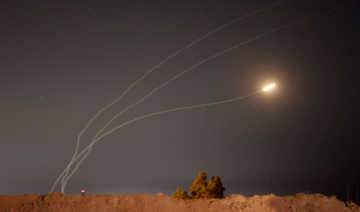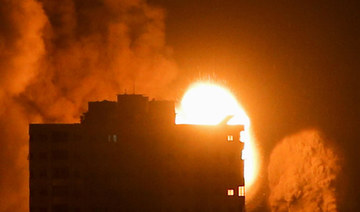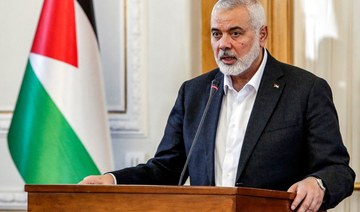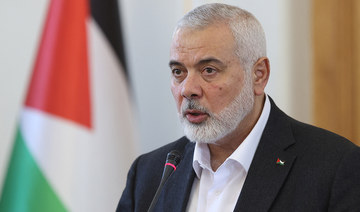GAZA: Gaza’s hospitals were already struggling to cope with the COVID-19 pandemic before the conflict with Israel erupted last week. Now, medics say, they are being stretched further.
“The Ministry of Health is fighting on two fronts in the Gaza Strip — the coronavirus front and the other front, which is more difficult, is the injuries and the wounded,” said Marwan Abu Sada, the director of surgery in Gaza’s main Shifa hospital.
More than a week into fighting, with Palestinians pounded night and day by airstrikes and Israelis racing for refuge from rockets as sirens wail, Gaza’s doctors are battling to keep pace.
At Shifa, the biggest health facility among the 13 hospitals and 54 clinics serving the crowded enclave’s 2 million people, the number of intensive care beds has been doubled to 32 as the toll of those wounded from the conflict mounts.
Like the rest of the system, the 750-bed hospital faced shortages of medicines and equipment before fighting erupted on May 10 — blamed by medics on a blockade led by Israel and backed by Egypt, which shares a border with Gaza.
Israel says its measures aim to stop arms reaching militants.
“The list of essential medications and medical disposables suffered an acute shortage,” Abu Sada said.
It’s not just medicines in short supply. Fuel for generators that power Gaza’s hospitals — with main’s power too intermittent to be relied on — is also running out.
Israel says its blockade does not aim to stop medicines or other humanitarian supplies, and any shortages are the result of actions by Hamas, the Islamist group that has run Gaza since 2007, when the blockade was imposed.
“Hamas constructed a network of underground terror tunnels in Gaza underneath the homes of Palestinians, using funds meant for their health & welfare to expand Hamas’ terror machine instead,” Israel’s Foreign Ministry said on Twitter Monday.
Hamas has rejected the accusation.
Palestinians say 201 people have been killed in Gaza since the fighting started, with hundreds more hurt, including those wounded by shrapnel or injured by collapsing buildings.
Israel has reported 10 dead in the rocket salvoes, with many more injured, some directly by the blasts and others when dashing to safety. Some are in a critical condition.
“We have a very bad time over here,” said Racheli Malka, an Israeli living in Ashkelon, a city north of Gaza repeatedly hit by rockets. “I hope it will finish fast.”
Nearby, Israelis celebrated the Jewish festival of Shavuot in a synagogue that had a hole caused by a rocket strike.
The Israeli military said Hamas — regarded by Israel, the United States and European Union as a terrorist group — and others militants had fired about 3,150 rockets in the past week.
Sacha Bootsma, the head of the World Health Organization in Gaza, said COVID-19 had strained the enclave’s struggling system.
“Before COVID, the health system could be categorized as fragile because it has very old equipment, old buildings, a shortage of properly trained health staff and, of course, a chronic shortage of essential medicines,” she said.
Gaza has reported about 106,000 cases of COVID-19, or about 5.3 percent of the population, with 986 deaths, health official say.
While Israel has rolled out one of the fastest vaccination programs in the world, fully inoculating about 55 percent of its 9.3 million people, Gaza received about 110,000 doses, or enough for 55,000 people, health officials say, to be distributed among one of the most densely populated areas in the world.
One ward at Shifa, still marked “Corona Isolation Department,” has had to be turned into an intensive care unit for those injured in the conflict.
“We require more urgent support from international and relief institutions,” said Ashraf Al-Qidra, spokesman for the ministry of health, calling for medicines and ambulances.
For those living near Shifa hospital, the sound of ambulances wears on their already shattered nerves. “As long as we hear sirens we know it is not over yet,” said Karam Badr, 57.
Yet, health care workers keep the creaking medical facilities going. WHO’s Bootsma said scarce resources were still reaching those most in need.
“The resilience of the health system is remarkable,” she said.
COVID and conflict: Gaza’s hospitals strained on two fronts
https://arab.news/yk6c7
COVID and conflict: Gaza’s hospitals strained on two fronts
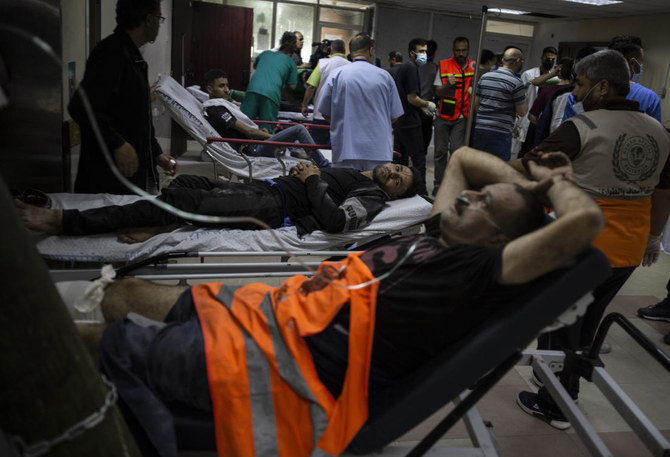
- Ministry of Health is fighting on two fronts in the Gaza Strip - the coronavirus and the injuries
- List of essential medications and medical disposables suffered an acute shortage, said director of surgery in Gaza's main Shifa hospital
Hamas chief Haniyeh arrives in Turkiye for talks
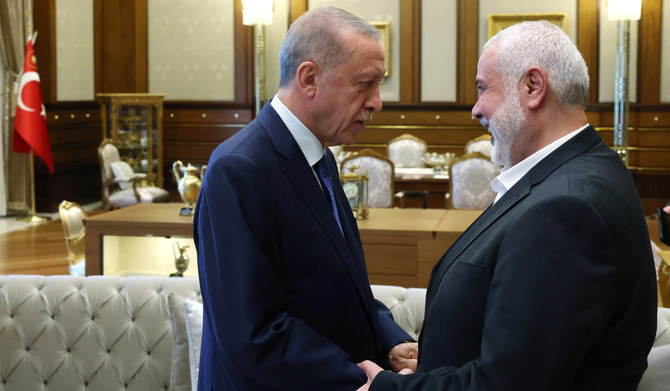
- Fidan said he spoke with Haniyeh, who lives in Qatar, about how Hamas — designated as a terrorist organization by Israel, the United States and the European Union — “must clearly express its expectations, especially about a two-state solution”
ISTANBUL: A leader of Palestinian militant group Hamas, Ismail Haniyeh, arrived in Istanbul Friday evening for talks with Turkish President Recep Tayyip Erdogan as the death toll in Gaza passed 34,000.
A statement from Hamas Friday said Erdogan and Haniyeh would discuss the conflict in Gaza, adding that the head of the group’s political bureau was accompanied by a delegation.
Middle East tensions are at a high after Israel’s reported attack on Iran and Gaza bracing for a new Israeli offensive.
Erdogan insisted on Wednesday that he would continue “to defend the Palestinian struggle and to be the voice of the oppressed Palestinian people.”
But talking to journalists on Friday, he refused to be drawn on the details on the meeting.
Turkish Foreign Minister Hakan Fidan was in Qatar Wednesday and said he spent three hours with Haniyeh and his aides for “a wide exchange of views in particular about negotiations for a ceasefire.”
Qatar, a mediator between Israel and Hamas, acknowledged Wednesday that negotiations to end hostilities in Gaza and liberate hostages were “stalling.”
Fidan said he spoke with Haniyeh, who lives in Qatar, about how Hamas — designated as a terrorist organization by Israel, the United States and the European Union — “must clearly express its expectations, especially about a two-state solution.”
Erdogan’s last meeting with Haniyeh was in July 2023 when Erdogan hosted him and Palestinian president Mahmud Abbas at the presidential palace in Ankara. Haniyeh had last met Fidan in Turkiye on January 2.
The war in Gaza started after Hamas’s unprecedented attack on Israel on October 7 that resulted in the deaths of about 1,170 people, mainly civilians, according to an AFP tally of official Israeli figures.
Militants also took about 250 hostages. Israel says around 129 are believed to be held in Gaza, including 34 presumed dead.
Israel’s retaliatory military campaign has killed at least 34,012 people, mostly women and children, according to Gaza’s Hamas-run health ministry.
Huge blast at military base used by Iraqi Popular Mobilization Forces, sources say

- PMF sources said the strikes targeted a headquarters of the PMF at the Kalso military base near the town of Iskandariya around 50 km south of Baghdad
BAGHDAD: A huge blast rocked a military base used by Iraq’s Popular Mobilization Forces (PMF) to the south of Baghdad late on Friday, two PMF and two security sources told Reuters.
The two security sources said the blast was a result of an unknown airstrike, which happened around midnight Friday.
The two PMF sources pointed out the strikes did not lead to casualties but caused material damage.
PMF sources said the strikes targeted a headquarters of the PMF at the Kalso military base near the town of Iskandariya around 50 km south of Baghdad.
Government officials did not immediately respond to a Reuters request for comment.
The PMF started out as a grouping of armed factions, many close to Iran, that was later recognized as a formal security force by Iraqi authorities.
Factions within the PMF took part in months of rocket and drone attacks on US forces in Iraq amid Israel’s Gaza campaign but ceased to do so in February.
Leaders of Jordan and Pakistan call UAE president to express concern about effects of severe storm

- Leaders passed on their best wishes to the country as it recovers from the storms
DUBAI: The president of the UAE, Sheikh Mohammed bin Zayed Al-Nahyan, received telephone calls from King Abdullah of Jordan and Pakistan’s Prime Minister Shehbaz Sharif on Friday, during which they expressed concern about the effects of the severe weather, including unusually heavy rainfall, that battered parts of the country this week.
They also passed on their best wishes to the country as it recovers from the storms and “conveyed their heartfelt hopes for the safety and prosperity of the UAE and its people, praying for their protection from any harm,” the Emirates News Agency reported.
Sheikh Mohammed thanked both leaders for their warm sentiments, and emphasized the strong bonds between the UAE and their nations.
The UAE and neighboring Oman were hit by unprecedented rainfall and flooding on Tuesday, with more than 250 millimeters of rain falling in parts of the Emirates, considerably more than is normally seen in a year. Dubai International Airport was forced to close temporarily when runways were flooded.
Peshmerga fighter dies in Turkish strike in north Iraq

JEDDAH: A member of the Kurdish Peshmerga security forces was killed on Friday in a Turkish drone strike in the autonomous Kurdistan region of northern Iraq.
Ankara regularly carries out ground and air operations in the region against positions of the outlawed PKK, the Kurdish separatist group that has waged a decades-long insurgency against the Turkish state.
The victim of Friday’s attack died in a drone strike on his vehicle, said Ihsan Chalabi, mayor of the mountainous Sidakan district near Iraq’s borders with Turkiye and Iran.
For decades, Turkiye has operated several dozen military bases in northern Iraq in its war against the PKK, which Ankara and its Western allies consider a terrorist group.
Both Baghdad and the Kurdish regional government have been accused of tolerating Turkiye’s military activities to preserve their close economic ties.
At the beginning of April, a man described as “high-ranking military official” from the PKK was killed in a Turkish drone strike on a car in the mountainous Sinjar region, according to the Kurdistan counterterrorism services.
Turkish President Recep Tayyip Erdogan is expected to visit Baghdad on Monday on his first official visit to Iraq since 2011.
Iraq’s Defense Minister Thabet Al-Abassi in March ruled out joint military operations against the PKK, but said that Turkiye and Iraq would “work to set up a joint intelligence coordination center.”
Middle East in ‘shadow of uncertainty due to regional conflicts’

WASHINGTON: Economies in the Middle East and North Africa face a “shadow of uncertainty” from ongoing tensions in the region, a senior IMF official said.
“We are in a context where the overall outlook is cast into shadows,” Jihad Azour, the International Monetary Fund’s director for the Middle East and Central Asia department, said in an interview in Washington.
“The shadow of uncertainty on the geopolitical side is an important one,” added Azour, a recent candidate for the next Lebanese president.
In the face of the ongoing conflicts in Gaza and Sudan and a recent cut to oil supplies by Gulf countries, the IMF has pared back its growth outlook for the Middle East and North Africa region once again.
FASTFACT
Economic activity in Gaza has ‘come to a standstill’ and the IMF estimates that economic output in the West Bank and Gaza contracted by six percent last year.
The IMF expects growth in MENA of 2.7 percent this year — 0.2 percentage points below its January forecast — before picking up again next year, the IMF said in its regional economic outlook report.
The risks to growth in the MENA region remain heightened, the IMF said, pointing to the danger of greater regional spillovers from the ongoing Israel-Gaza war.
“We have concerns about the immediate and lasting impact of conflict,” Azour said.
The IMF report said that economic activity in Gaza has “come to a standstill” and estimates that economic output in the West Bank and Gaza contracted by 6 percent last year.
The IMF said the report excludes economic projections for the West Bank and Gaza for the next five years “on account of the unusually high degree of uncertainty.”
The IMF cannot lend to the West Bank and Gaza because they are not IMF member countries.
However, Azour said it has provided the Palestinian Authority and the central bank with technical assistance during the current conflict.
“When we move into the reconstruction phase, we will be part of the international community support to the region,” he added.
Azour also discussed the situation in Sudan, where thousands have been killed in a civil war that has also devastated the economy, causing it to contract by almost 20 percent last year, according to the IMF.
“The country is barely functioning, institutions have been dismantled,” he said.
“And for an economy, for a country like Sudan, with all this potential, it’s important to stop the bleeding very quickly and move to a phase of reconstruction,” he added.
The recent Houthi attacks have particularly badly hit the Egyptian economy on Red Sea shipping, which caused trade through the Egypt-run Suez Canal to more than halve — depriving the country of a key source of foreign exchange.
Egypt reached an agreement last month to increase an existing IMF loan package from $3 billion to $8 billion after its central bank hiked interest rates and allowed the pound to plunge by nearly 40 percent.
A key pillar of the current IMF program is the privatization of Egypt’s state-owned enterprises, many of which are owned by or linked to the military.
“This is a priority for Egypt,” Azour said. Egypt needs to have a growing private sector and give space for the private sector to create more jobs.”
“We have an opportunity to re-engineer the state’s role, to give the state more responsibility as an enabler and less as a competitor,” he said.



